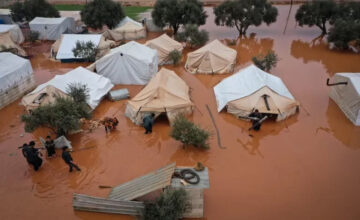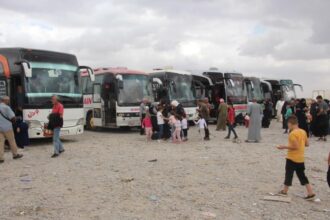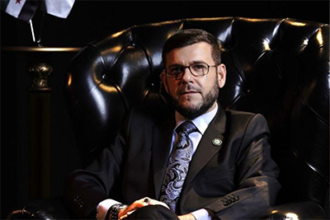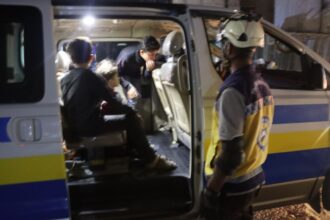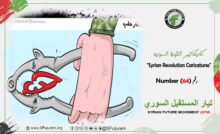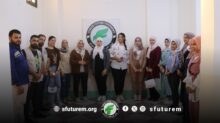The Democratic Syrian Meeting (2)

In the previous article, we discussed the nature of the meeting, its contexts, and how its path began. In this concise article, we will highlight some points that we see as essential in the Syrian future stream before the meeting is held in Berlin on Friday and Saturday, the 20th and 21st of this month. We might have a stance to take based on the meeting’s outcome.
In this article, we will explain our position on the idea of the Democratic Syrian Meeting through three determinants:
First determinant:
- The image of the civilized and cultured Syrian people has deteriorated due to the regime’s arrogance and its use of a security grip, resulting in the emergence of extreme nationalist or religious groups. This caused the Syrian mentality to evolve towards a tragic backward reality, dominated by warlords, mafias, displacement, killings, and imprisonments of Syrians. It took Syria and its people back to the dark ages in human history. Hence, the Democratic Syrian Meeting was the beacon that restores the glow and truth of this people, which the Syrian regime tried to erase by all means.
- Undoubtedly, any democratic practice requires experience. With the lack of any organizational or theoretical democratic communication that approaches and interacts with reality, Syrians lose the daily touch with each other to exchange experiences democratically, based on freedom of expression and opinion. Thus, the success of the Democratic Syrian Meeting provides Syrians the opportunity to create this experience among themselves, progressively moving towards establishing the principles of Syrian democratic work and thought.
- The idea of reaching an agreement and understanding on the basic papers of the meeting before convening, and making this meeting in Berlin merely an announcement, is a good step in preventing the meeting’s failure, considering that most Syrian meetings end on their first day due to unorganized disputes! Therefore, the various committees of the meeting have done commendable work in collecting the basic papers through surveys, presenting objections, and other methodological means to mend the rift from the start.
- In 1961, in one of the “Frankly” articles he used to publish in the Egyptian “Al-Ahram”, Mohamed Hassanein Heikal recounted that Shukri al-Quwatli (1891 – 1967), the Syrian president at the time, directed the following statement to the Egyptian president Gamal Abdel Nasser, commenting on the signing of the unity agreement between the two countries in February 1958: “You don’t know what you’ve taken, Mr. President! You’ve taken a people where everyone believes they are politicians, 50% believe they are leaders, 25% believe they are prophets, and at least 10% believe they are gods.”
Despite this exaggerated portrayal of the Syrian people, it has remained in the minds of Syrians. And even if this characteristic is positive, it is undoubtedly steeped in isolationism, chauvinism, and a belief in the infallibility of decisions! Thus, the Democratic Syrian Meeting comes as a means to turn this characteristic into a positive one by gathering Syrians who believe in democracy and genuine mutual dialogue among themselves. It allows them to understand their differing perspectives, come together on agreed-upon points, and find justifications for disagreements. If the Syrian meeting in Berlin had only this positivity, it would be sufficient.
The second point:
There are drawbacks that occurred in the Syrian Democratic Meeting’s journey that need to be addressed and overcome. Mistakes can happen in any human endeavor, but pointing them out is crucial. We can focus on three main points that caused confusion, and the purpose of mentioning them is the necessity to consider them:
- Closing the official dialogue room for the meeting, where dialogue was supposed to continue regardless of circumstances. The official meeting room remained fixed without discussion, with official decisions and interactions happening through it. However, shutting down the dialogue vent before the meeting invited hiding diverse contrasting ideas without sharing them, confronting them, and molding and articulating them.
- The presence of figures affiliated with entities that the founders and participants in the meeting agreed to neutralize; and figures who hold political positions that harm the Syrian revolution and the Syrian people and do not represent them at all.
- Setting quotas for women and another for youth without detailed elaboration, which possibly resulted in some justified criticisms that also need reassessment.
The third point:
We can point out challenges that obstruct or may obstruct the success of the Syrian Democratic Meeting in the future, which require consideration of their negative impact and addressing them, including:
- The entry of many entities and figures claiming to support the project and meeting, but harboring intelligence intentions or seeking to sabotage and fragment any genuine democratic effort.
- Searching for a self-funding mechanism that possesses durability so that the meeting does not face a crisis that may force it to halt, or looking for external funding that might influence its future independent decisions.
- There are figures who believe that “democracy” means imposing their vision and not respecting others’ positions and opinions. They might use forms of moral coercion or disruption in the meeting rooms, and these individuals should be warned and limited.
- For the meeting to not represent all Syrians or even democrats is fine. However, remaining in an unclear and non-cohesive state might make it a democratic guide at best, or, if we’re optimistic, a gathering to exchange views without real interaction and regulation.
Lastly..
The Syrian Future Movement (SFM) views this meeting as a step in the right direction. It establishes a democratic culture and contributes to its popular and political dissemination. It might succeed in being an effective actor in shaping the new Syrian state entity, and in thwarting all the sectarian, fragmentary, religious, and nationalist projects that openly carry illusory solutions appealing to emotions, but deep down carry the tool of destruction for the state, society, and the Syrian people.”
